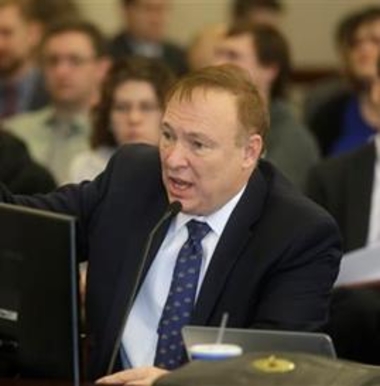LGBT anti-discrimination bill passes Utah Senate

Salt Lake City (AP) — Members of Utah's state Senate told personal stories of discrimination and even invoked the state's polygamist history during a Friday afternoon debate on a landmark bill that protects gay and transgender people from discrimination while also protecting religious rights.
The Republican-controlled Senate voted 23-5 to pass the Mormon church-backed anti-discrimination bill first unveiled Wednesday. That speedy approval sends the measure to the GOP-controlled House, where the bill would need approval before lawmakers adjourn at midnight Thursday.
Republican Gov. Gary Herbert has said he'll sign it if it reaches his desk.
The bill bars discrimination against LGBT people when it comes to housing and employment, but it exempts religious groups and protects the rights of religious people to voice their beliefs.
Several senators on Friday drew parallels to discrimination that lesbian, gay, bisexual and transgender people face to personal experiences of discrimination they have faced as ethnic minorities.
Democratic Sen. Jani Iwamoto, who is of Japanese ancestry, spoke of the internment of Japanese-Americans during World War II.
"This is the civil rights issue of our time," Iwamoto said of the push for LGBT rights.
Sen. Alvin Jackson, a Republican from Highland, said he could not vote for the bill because he didn't think it does enough to protect religious rights, but also said he was concerned about the bill because he finds it disturbing when LGBT advocates compare their fight to the struggle for black civil rights and activists in that effort.
"To me, their collective efforts have been minimized, when you take that list that has race on it, and you put sexual orientation and gender identity right next to it. I cannot accept that," said Jackson, who is African-American. "I'm a member of The Church of Jesus Christ of Latter-day Saints, I'm proud to say that. But my black Baptist roots won't allow me to accept what's in this legislation."
Senators voting against the bill also said they were concerned about creating special protections for gay and transgender people, while supporters said it struck a delicate balance between LGBT protections and religious rights.
Sen. Howard Stephenson, R-Draper, supported the bill and told his colleagues, many of whom are also members of The Church of Jesus Christ of Latter-day Saints, that their ancestors were once discriminated against too because they practiced polygamy, something the mainstream church has since abandoned and now strictly prohibits.
"America thought that Mormons were sexually deviant because they chose to share their love in a way that was not conventional," Stephenson said.
The Mormon church said this week it is fully behind the legislation, which follows the principles set out in its call for laws that balance religious rights and LGBT protections.
The bill exempts religious groups and organizations from the requirement, and affiliated organizations such as hospitals, churches and schools.
For example, Brigham Young University, a private school owned by the Mormon church, would be exempt.
It allows employers to adopt "reasonable dress and grooming standards" and "reasonable rules and polices" for gender-specific restrooms and other facilities, as long as they also accommodate transgender people.
The bill doesn't spell out specifics about how to do that, nor does it address thornier discrimination questions about whether a business has to serve someone for religious reasons, such as a wedding photographer who objects to photographing a same-sex marriage.
For religious rights, it protects the right of an individual employee to express their religious or moral beliefs in "a reasonable, non-disruptive or non-harassing way," as long as it doesn't interfere with the company's business.
For example, Planned Parenthood could ban employees from wearing a "Right to Life" button, according to University of Illinois law professor Robin Fretwell Wilson, who helped write the bill.
The proposal also includes a specific exemption for the Boy Scouts of America, which has a ban on gay adult Scout leaders. The organization did not participate in negotiations.
The organization was included because of a 2000 U.S. Supreme Court decision recognizing its constitutional right to exclude gay members. The organization now allows openly gay youths.
By Michelle L. Price, Associated Press. Copyright 2015 The Associated Press. All rights reserved. This material may not be published, broadcast, rewritten or redistributed.
The Gayly – March 7, 2015 @ 9:45am.





